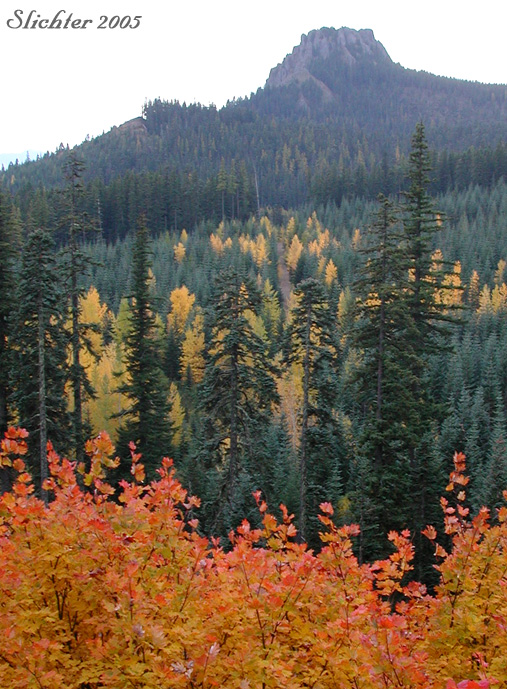
Road #2360 ascends from the major south to north access road on the western slopes of Mt. Adams upwards to the crest of the ridge which extends southwards from Swampy Meadows on the north to Sleeping Beauty on the south. Although fairly heavily logged, the road passes numerous open slopes (often clear cuts), some of which are very steep and rocky and thus provide a habitat for wildflowers that like open, dry conditions. In addition, several spots along the road provide very good views of the entire southern face of Mt. Adams. The view includes McDonald Ridge (access to the south climb route) on the far eastern horizon, Crofton Ridge, views to the meadows at the mouth of Cascade Creek, Stagman Ridge and on the north the slope upon which the Pacific Crest Trail climbs from Rd #23 to the Round the Mt. Trail #9 beneath the Hump and the Bumper. Glaciers which can be seen from this area (from east to west) include the Crescent Glacier, Avalanche Glacier, White Salmon Glacier, Pinnacle Glacier, and a partial profile of the Adams Glacier. With strong binoculars, one could watch climbers ascending and descending the numerous climb routes on the southern slopes of Mt. Adams.
Rd #2360 is blocked by downed timber and an earthen berm about one-half mile north of its junction with Rd #071. One could park here and then walk the rest of the road to its northernmost extent.
1. Imbricate Sword Fern: Polystichum imbricans ssp. imbricans -
2. Northern Bracken Fern: Pteridium aquilinum var. pubescens -
3. Silver Fir, Lovely Fir: Abies amabilis -
4. Noble Fir: Abies procera - This is the area on Mt. Adams where I have seen the largest concentration of this species of fir.
5. Western Larch: Larix occidentalis -
6. Lodgepole Pine: Pinus contorta -
7. Western White Pine: Pinus monticola -
8. Ponderosa Pine: Pinus ponderosa - Only several members of this species seen. This is probably about as far west as this species gets on Mt. Adams.
9. Douglas Fir: Pseudotsuga menziesii var. menziesii -
10. Western Red Cedar: Thuja plicata -
11. Red Alder: Alnus rubra -
12. Black Cottonwood: Populus balsamifera ssp. trichocarpa -
13. Beargrass: Xerophyllum tenax -
15. Thimbleberry: Rubus parviflorus var. parviflorus -
16. Round-leaved Violet: Viola orbiculata -
17. Mountain-boxwood: Paxistima myrsinites -
18. Snowbrush: Ceanothus velutinus var. hookeri -
19. Vine Maple: Acer circinatum -
20. Pinemat Manzanita: Arctostaphylos nevadensis ssp. nevadensis
21. Pinedrops: Pterospora andromedaea -
22. Huckleberry: Vaccinium sp. - Plants have largely lost their leaves by this date.
23. Narrow-sepaled Phacelia: Phacelia leptosepala -
24. Penstemon: Penstemon (attenuatus) ? -
25. English Plantain: Plantago lanceolata -
* 27. Spotted Knapweed: Centaurea bieberstanii (formerly C. maculosa) - There are hundreds, if not thousands of this species along this road, especially at lower elevations ascending from Rd #23.
29. Oxeye Daisy: Leucanthemum vulgare -
Animals Seen Along This Route:
3 Ravens
Numerous Varied Thrushes
Winter Wren